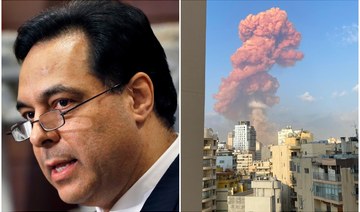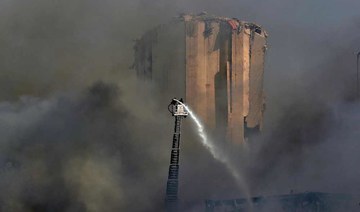BEIRUT: The judicial investigator of the Beirut port bombing has said he will interrogate caretaker Prime Minister Hassan Diab at 9 a.m. on Friday.
The move means the judge has decided to proceed with his allegations against those accused of involvement in the explosion crime on Aug. 4, in which 202 people were killed.
Judge Fadi Sawan was supposed to go to the Prime Minister’s office on Monday to interrogate Diab after he had charged him and 3 other ministers with “negligence causing the death and injury of hundreds of people.”
The massive explosion of tons of ammonium nitrate injured more than 6,500 people and destroyed Beirut’s waterfront and entire residential neighborhoods.
Arab News learned from judicial sources that Judge Sawan also set next Friday as a date for the questioning of the former Minister of Public Works and Transport Ghazi Zaiter.
On Tuesday, Judge Sawan is scheduled to question two defendants, a member of the Higher Council of Customs, Hani Hajj Shehadeh, and the former customs chief, Moussa Hazimeh.
The former Minister of Finance, Ali Hassan Khalil, and the former Minister of Public Works and Transportation, Youssef Fenianos, is to be questioned on Thursday.
Zaiter and Hassan Khalil said that they would not appear before Judge Sawan for questioning because “Sawan is violating constitutional principles.”
The Prime Minister’s media office repeated Diab’s previous position, which “respects the constitution that has been violated by Judge Sawan.”
On Monday, Diab resumed his job as usual in the Prime Minister’s office according to a schedule that did not include an appointment with Judge Sawan.
Mohammed Fahmy, interior minister in the caretaker government, confirmed his rejection of “targeting the prime minister’s position in the Beirut port explosion case because of the consequences of a 7-year-old complicated file cannot be blamed on a prime minister who has only been in office for a few months.”
Fahmy said that if Judge Sawan decides to issue arrest warrants against Diab and the accused former ministers, he (Fahmy) will not carry out any warrant and will not ask the security services under his authority to carry out a judicial decision of this kind. “They may prosecute me if they wish,” he said.
The number of officials, employees and workers arrested over the port explosion has reached 25, and there is a charge in absentia against the owner and captain of the ship that carried the ammonium nitrate.
The Future Parliamentary Bloc criticized against those who “stand behind Diab’s accusation.”
MP Mohammed Al-Hajjar, from the Future bloc, said: “Judge Sawan may have been pressured by the presidential team to take this option in the investigation, and Sawan was provided with false legal information to take a step that does not respect constitutional principles.”
The Amal Movement, to which ministers Zaiter and Hassan Khalil belong, said that the move by Judge Sawan was “contrary to the constitutional rules, and the port investigation must be kept away from any politicization.”
However, many activists carried out a sit-in in front of the Palace of Justice in Beirut, in solidarity with Judge Sawan.
Hayat Arslan called on Judge Sawan to “summon every perpetrator, and he must not retreat because his authority is from the people.”
Bahjat Salameh said: “If the state is against him, then he must know that the people are with him. Justice is indivisible and does not belong to a sect or doctrine, and every person who commits major or minor crimes must be brought to justice.”
The disobeying of Judge Sawan’s summons and solidarity with Diab contributed to the complexity domestic scene, amid the labors to form a government and the audit file in the Central Bank’s accounts.
The media office of the Prime Minister-designate, Saad Hariri, revealed that he “visited the President of the Republic 12 times so far in a relentless attempt to reach an understanding regarding the formation of the government, and each time Aoun expressed his satisfaction with the discussion process, and then things had changed after Hariri left the Republican Palace.”
In a statement on Monday, Hariri declared that “the Prime Minister-designate wants a government of non-partisan specialists to stop the collapse of the country and rebuild what was destroyed by the port explosion, while the president of the republic calls for a government in which all political parties are represented, including those that nominated the Prime Minister-designate or those that opposed his nomination.
“This will inevitably lead to controlling the decision-making process in the government, and will lead to the repetition of the experiences of several governments that were controlled by the factors of quotas and political tensions.”
He said that during his last visit to Aoun, Hariri “presented him with a complete government list with names and portfolios, including four names from the list that the President of the Republic handed over to the Prime Minister-designate” at a previous meeting.


























